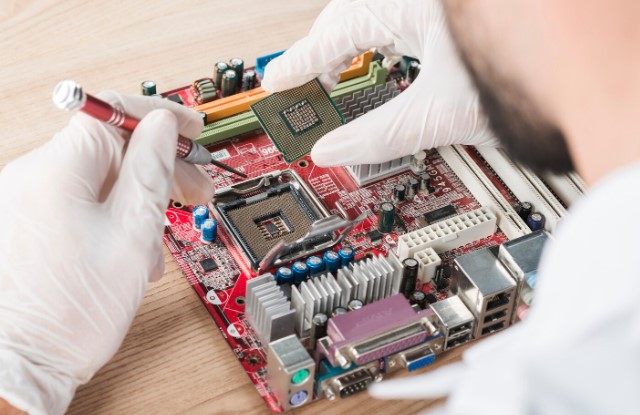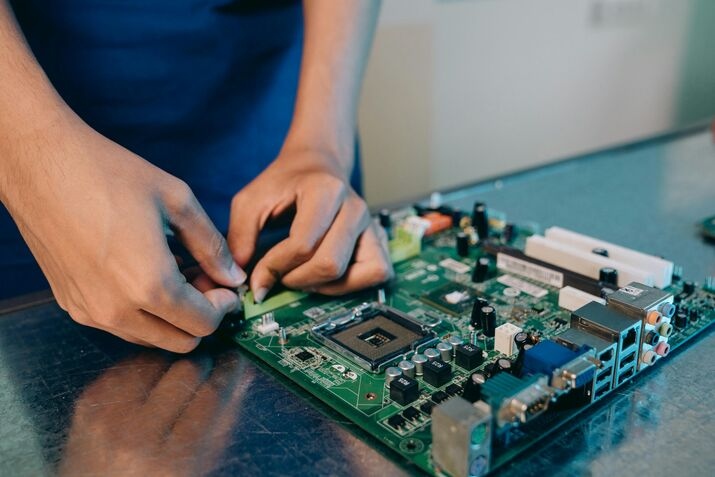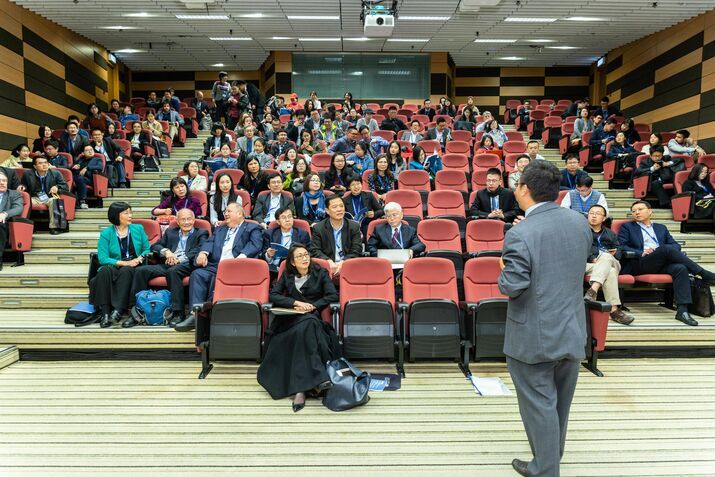In the present digital world, computer hardware is a major factor in the entire range of personal computers, from the best gaming systems to the giant servers of the latter. Because of that, a basic knowledge of computer hardware will not only save the techies but also aid the experts, students, and companies who seek to be well-informed when purchasing.
If you are either assembling your computer, upgrading an existing one, or just interested in a general way the workings of computers, this guide will entail all that there is to know about computer hardware in the USA.
What Is Computer Hardware?
Computer hardware designates the actual physical parts that constitute a computer system. Hardware is physical, while software consists of invisible programs and systems; hence, they are different.
Computer hardware has some common forms as follows:
- Central Processing Unit (CPU)
- Graphics Processing Unit (GPU)
- Motherboard
- RAM (Random Access Memory)
- Storage devices (HDD, SSD)
- Power supply units (PSU)
- Peripheral devices like keyboards, mice, and monitors
To sum it up, computer hardware is the basic building block of any computer system, which is a decisive factor for the computer to carry out the commands quickly and with high reliability.
Types of Computer Hardware
Computer hardware can be classified into two broad categories, which are internal and external components. To start with, we are going to have an insight into the internal hardware components.
Internal Hardware Components
- Central Processing Unit (CPU)
The CPU can often be called the heart of the computer. It carries on instructions, does calculations, and organizes data movement among the components. In 2025, CPUs are like mega machines, and therefore, they take up multi-core processing and advanced architectures as well.
- Motherboard
A motherboard connects every component inside a computer, so they can effectively talk to each other. Also, the modern motherboards come with slots for RAM, GPUs, storage, and such.
- Random Access Memory (RAM)
RAM holds the data for the CPU, which it needs to access quickly, temporarily. Having more RAM provides a computer with the capabilities of performing several tasks simultaneously and faster, thereby leading to the generation of more performance. Thus, RAM upgrade is regarded as one of the easiest and most effective ways to raise the power of a computer.
- Graphics Processing Unit (GPU)
GPUs take care of producing images, videos, and 3D graphics. Thus, if a gamer is dealing with video editing or AI applications, then a good-quality GPU is a must-have for such a person.
- Storage Devices
The storage place for the operating system, programs, and files of the user consists of devices such as HDDs and SSDs. SSDs are faster in read/write than traditional HDDs and thus, they lead to faster boot times and quick application loading.
- Power Supply Unit (PSU)
The PSU is the power source for all internal hardware components. Thus, the efficacy of a PSU regulates the computer’s performance and protects the hardware from electrical damage.
External Hardware Components
- Monitors
Monitors show visual output from the computer. The options range from standard HD screens to innovative 4K and ultrawide monitors, which in turn, offer one, the most immersive experiences.
- Keyboards and Mice
Keyboards and mice are the ways through which the user interacts with the computer. There are, specifically, mechanical keyboards and high-DPI mice that enhance performance and give comfort for gaming and professional setups.
- Printers and Scanners
These are peripherals that help the user with the physical copies for digital documents and images, plus they are most significant in offices and educational areas.
- External Storage Devices
External drives and USB flash drives give extra storage and portability for important files. Thus, they are convenient as a means for backups and data transfer.

How to Choose the Right Computer Hardware
The choice of computer hardware fully depends on the exact needs and the allocated budget. For instance, a computer designed for gaming will call for a high-performance GPU and CPU, while a general office computer may depend on RAM and storage capacity.
Just a few tips to be mindful of are:
- Define your purpose: Gaming, professional work, or casual use.
- Set up a budget: The prices of hardware components can vary greatly.
- Check compatibility: Confirm that the motherboard can accommodate the CPU, RAM, and GPU you have.
- Plan for upgrades: Go with components that can be expanded later.
- Consider brand reputation: Trustworthy brands are mostly the ones that provide better reliability and warranty assistance.
So, it’s all about the “understanding of requirements” before “purchase”, hence, you save both time and money while constructing the perfect system.
The Importance of Upgrading Computer Hardware
The periodic hardware upgrades keep the computer system efficient, and the use of the latest software and applications is supported. For instance, the addition of just RAM or the switch to a computer with an SSD can tremendously increase performance; thus, no new computer is required.
There are other advantages gained by upgrading hardware:
- Processing speed is faster
- The addition of an improved graphics performance
- Incorporation of better multitasking capabilities
- Expanded storage capacity
Investing in appropriate upgrades can ensure the long life of the computer and the productivity of the users.
Computer Hardware Trends in the USA
The computer hardware market in the USA never stands still. For the moment, some of the trends include:
- High-Performance GPUs
More powerful graphics cards are becoming available due to the combined demands from all sides, such as gaming, AI, and cryptocurrency mining.
- NVMe SSDs
Wiping off the existence of traditional SATA SSDs, faster storage solutions like NVMe SSDs are becoming the new norm, thus improving the performance of the entire system.
- Liquid Cooling Systems
Intensive use of CPUs and GPUs causes heat generation; hence, the liquid-cooled systems help to remove the heat and keep the temperature low so that the CPUs and GPUs perform better and live longer.
- Mini PCs and Compact Designs
The trend for the smaller, more efficient PC designs is increasing popularity, especially in the case of home offices and portable workstations.
- Sustainable and Energy-Efficient Hardware
Environmental aspects give the manufacturers a hard time, hence they focus on lessening power consumption and the improvement of recyclability in order to comply with green standards.
Therefore, it is advisable for U. S. consumers to keep abreast of these trends so they can make more educated purchasing decisions.
Common Mistakes to Avoid When Buying Computer Hardware
Even seasoned users, at times, tend to err by buying the wrong hardware. Some typical mistakes to avoid:
- Not paying attention to compatibility among CPU, motherboard, and RAM
- Paying more than needed for top-notch components
- Not considering future upgrade possibilities
- Not remembering to include cooling and power consumption in the requirements
- Choosing among the brands without warranty or customer support
It is through the avoidance of the above mistakes that you will be able to put together a computer system that is both reliable and efficient without incurring unnecessary costs.
Maintaining Your Computer Hardware
For good and proper maintenance, your computer hardware will last longer and operate at its peak. Some of the things that should be treated as best practices are:
- Dusting off the fans, vents, and components regularly
- Updating the firmware and drivers
- Checking the temperatures of the system
- Conducting antivirus and malware scans
- Employing a UPS (Uninterruptible Power Supply) to safeguard against damage from power surges
What is more, documenting your hardware configuration will help you troubleshoot problems more easily and also plan future upgrades more efficiently.
Conclusion
Knowledge of computer hardware is the main prerequisite for building, upgrading, and maintaining the computer systems that are efficient. Each component plays a big role in the overall performance, from CPUs and GPUs to storage devices and peripherals.
In the USA, technology enthusiasts, students, and professionals are increasingly relying on high-performance hardware to cope with the ever-increasing demands of gaming, work, and creative projects. Therefore, if you want your computer to run smoothly for years to come, then make the right choice of components, keep abreast of trends, and maintain your system properly.
Ultimately, by knowing computer hardware, you can make good decisions, get the maximum performance, and enjoy all the benefits of modern computing.



